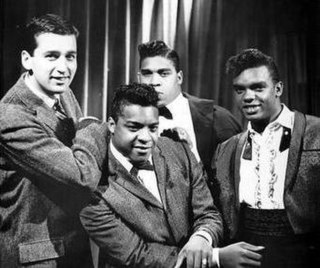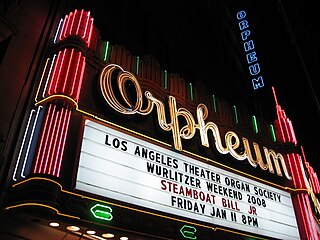
Long Island University (LIU) is a private university with two main campuses, LIU Post in Brookville, New York, on Long Island, and LIU Brooklyn in Brooklyn, New York City. The university offers over 500 academic programs at its main campuses, online, and at multiple non-residential locations. LIU has an NCAA Division I athletics programs and hosts and sponsors the annual George Polk Awards in journalism.

El Capitan Theatre is a fully restored movie palace at 6838 Hollywood Boulevard in the Hollywood neighborhood in Los Angeles, California, United States. The theater and adjacent Hollywood Masonic Temple are owned by The Walt Disney Company and serve as the venue for a majority of the Walt Disney Studios' film premieres.

The Kings Theatre is a theater and live performance venue at 1027 Flatbush Avenue in the Flatbush neighborhood of Brooklyn in New York City, United States. Designed by Rapp and Rapp as a movie palace, it opened on September 7, 1929, as one of five Loew's Wonder Theatres in the New York City area. The theater's interior decor was supervised by Rapp and Rapp along with Harold Rambusch. Owned by the New York City Economic Development Corporation, the Kings Theatre has been operated by the Ambassador Theatre Group since 2015. It is listed on the National Register of Historic Places.

The Chicago Theatre, originally known as the Balaban and Katz Chicago Theatre, is a landmark theater located on North State Street in the Loop area of Chicago, Illinois. Built in 1921, the Chicago Theatre was the flagship for the Balaban and Katz (B&K) group of theaters run by A. J. Balaban, his brother Barney Balaban and partner Sam Katz. Along with the other B&K theaters, from 1925 to 1945 the Chicago Theatre was a dominant movie theater enterprise. Currently, Madison Square Garden, Inc. owns and operates the Chicago Theatre as a 3600 seat performing arts venue for stage plays, magic shows, comedy, speeches, sporting events and popular music concerts.

The Fox Theatre, a former movie palace, is a performing arts center located at 527 N. Grand Blvd. in St. Louis, Missouri, United States. Also known as "The Fabulous Fox", it is situated in the arts district of the Grand Center area in Midtown St. Louis, one block north of Saint Louis University. It opened in 1929 and was completely restored in 1982.

The Bay Theatre is a single-screen movie theater in Seal Beach, California, United States. It is best known for its screenings of foreign and independent films, and for its revival screenings. The Bay Theatre is also home to a Wurlitzer organ, which is used for concerts and silent film screenings.

The Paramount Theatre is a 2,807-seat performing arts venue located at 9th Avenue and Pine Street in the downtown core of Seattle, Washington, United States. The theater originally opened on March 1, 1928, as the Seattle Theatre, with 3,000 seats. It was placed on the National Register of Historic Places on October 9, 1974, and has also been designated a City of Seattle landmark.

The Paramount Theatre was a 3,664-seat movie palace located at 43rd Street and Broadway on Times Square in Midtown Manhattan, New York City. Opened in 1926, it was a showcase theatre and the New York headquarters of Paramount Pictures. Adolph Zukor, founder of Paramount predecessor Famous Players Film Company, maintained an office in the building until his death in 1976. The Paramount Theatre eventually became a popular live performance venue. The theater was closed in 1964 and its space converted to office and retail use. The tower which housed it, known as the Paramount Building at 1501 Broadway, is in commercial use as an office building and is still home to Paramount Pictures offices.

The Clay Cole Show (1959–1967) was an American rock music television show based in New York City, hosted by Clay Cole.

The James M. Nederlander Theatre is a theater located at 24 West Randolph Street in the Loop area of downtown Chicago, Illinois. Previously known as the Oriental Theatre, it opened in 1926 as a deluxe movie palace and vaudeville venue. Today the Nederlander presents live Broadway theater and is operated by Broadway In Chicago, currently seating 2,253.
Clay Cole was an American host and disk jockey, best known for his eponymous television dance program, The Clay Cole Show, which aired in New York City on WNTA-TV and WPIX-TV from 1959 to 1968.

The Paramount Theatre is a concert venue in Denver, Colorado, located on Glenarm Place, near Denver's famous 16th Street Mall. The venue has a seating capacity of 1,870 but is a popular destination for large acts looking for a smaller concert setting. With spelling as Paramount Theater, the building was listed on the National Register of Historic Places in 1980.

The Bardavon 1869 Opera House, in the downtown district of Poughkeepsie, New York, United States, is the oldest continuously operating theater in New York State. Designed by J.A. Wood, it was built in 1869 and served as a venue for various performing arts, community meetings, and celebrations until 1923; it largely resumed this heritage by becoming a general performing-arts facility in 1976. In the interlude period from 1923 to 1975, it served as a cinema, although there were some live performances, especially vaudeville, during this period. Originally called the Collingwood Opera House after its owner and operator James Collingwood, the theater featured an unusual two-stage dome. Between 1869 and 1921, many notable figures of the day graced the Bardavon's stage, including Sarah Bernhardt and John Barrymore.

An atmospheric theatre is a type of movie palace design which was popular in the late 1920s. Atmospheric theatres were designed and decorated to evoke the feeling of a particular time and place for patrons, through the use of projectors, architectural elements and ornamentation that evoked a sense of being outdoors. This was intended to make the patron a more active participant in the setting.

The Orpheum Theatre at 842 S. Broadway in Downtown Los Angeles opened on February 15, 1926, as the fourth and final Los Angeles venue for the Orpheum vaudeville circuit. After a $3 million renovation, started in 1989, it is the most restored of the historical movie palaces in the city. Three previous theatres also bore the name Orpheum before the one at 842 Broadway was the final one with that moniker.

The Orpheum Theatre, also known as New Orpheum Theatre and Orpheum Electric Building, is a performing arts center located at 528 S. Pierce Street in Sioux City, Iowa. Built in 1927 as a vaudeville and movie palace, the theatre was restored in 1999 and today is the home of the Sioux City Symphony Orchestra.

The Riverside Theater is a concert hall located in Milwaukee, Wisconsin. The venue seats 2,480 people and hosts many different musicians, comedians, shows, and events. It is leased by the Pabst Theater Foundation.

LIU Brooklyn is a private university in Brooklyn, New York. It is the original unit and first of two main campuses of the private Long Island University system.

The Paramount Theater is an historic theater located at 1676-1708 Main Street in Springfield, Massachusetts. Built in 1926 out of part of the grand Massasoit House hotel at a cost of over $1 million, the Paramount Theater was the most ornate picture palace in Western Massachusetts. As of 2011, The Paramount is in the midst of a $1.725 million renovation to once again become a theater after decades as a disco and concert hall,, when it was the center of Springfield's club scene. In 2018 the building's owners, the New England Farm Workers Council, announced plans to redevelop it in tandem with a new adjacent hotel building. In a push to renovate the Paramount along with Holyoke's Victory Theater, in October 2018, the administration of Massachusetts Governor Charlie Baker announced a $2.5 million grant to assist the project, on top of a $4 million federal loan guarantee. However, the New England Farm Workers Council would subsequently announced plans to sell the building on July 30, 2024. An auction was slated for August 20 of that year before being delayed to September 23.

The Tivoli Theatre, also known as the Tivoli and the "Jewel of the South", is a historic theatre in Chattanooga, Tennessee, that opened on March 19, 1921. Built between 1919 and 1921 at a cost of $750,000, designed by famed Chicago-based architectural firm Rapp and Rapp and well-known Chattanooga architect Reuben H. Hunt, and constructed by the John Parks Company, the theatre was one of the first air-conditioned public buildings in the United States. The theatre was named Tivoli after Tivoli, Italy, has cream tiles and beige terra-cotta bricks, has a large red, black, and white marquee with 1,000 chaser lights, and has a large black neon sign that displays TIVOLI with still more chaser lights.






















